|
|
| |
| EVENTS |
|
|
> Good Civil-Military Relations in Pakistan require patience and continuation of democracy
- German model of Civil-Military Relations offers contrast, not comparisons for Pakistan�s Civil-Military Relations
- German Parliament approves number of defence troops annually through defence budget; sanctions overseas deployment of German Military
- While Germany has learnt from defeat of World War, Pakistani state and society have not learnt lessons from defeats in 1965 and 1971 wars
- Parliament and Defence Committees should define security policy of the country
- Bad governance and poor socio-economic situation leads to military takeover
- Parliament and Government must create conditions for Civilian and Parliamentary Oversight of Defence in Pakistan
|
|
|
|
| |
Islamabad, February 02; In a Briefing Session on Civil Military Relation in Germany, Lessons for Pakistan, panellists and participants believed that establishing a constitutional equation of Civil-Military Relations in Pakistan requires patience, maturity and continuation of democracy. The briefing was organised to discuss lessons from the civil-military relations in Germany gained through a FES-PILDAT Study Visit for selected members of the PILDAT Dialogue Group on Civil-Military Relations in November-December last year. |
|
| |
Panellists at the Briefing Session included Mr. Shahid Hamid, Senior Advocate Supreme Court of Pakistan and former Federal Minister of Defence, Establishment and Law and former Governor Punjab; Dr. Syed Riffat Hussain, Chairman, Department of Defence and Strategic Studies, Quaid-e-Azam University, Islamabad; Mr. Mujib-ur-Rehman Shami, Editor-in-Chief Daily Pakistan and former President of the Council of Pakistan Newspaper Editors; Lt. Gen. (Retd.) Abdul Qadir Baloch, MNA, former Governor Balochistan; Ms. Anja Minnaert, Resident Representative FES Pakistan; Mr. Ahmed Bilal Mehboob, Executive Director PILDAT and Ms. Aasiya Riaz, Joint Director PILDAT. Other delegates who were part of the Study Visit to Germany, namely Mr. Faisal Karim Kundi, MNA, Deputy Speaker National Assembly of Pakistan and Lt. Gen. (Retd.) Ali Muhammad Jan Aurakzai, former Governor Khyber Pakhtunkhwa province (formerly NWFP), could not join the Briefing to share their learning and experiences gained through the Study Visit to Germany that took place from November 28 - December 03, 2010.
|
|
| |
Distinguished participants at the Briefing Session included Parliamentarians, distinguished members of the PILDAT Dialogue Group on Civil-Military Relations, former and serving military personnel, civil society representatives, columnists, academics and the media. |
|
| |
Mr. Shahid Hamid, who also wrote a paper on the topic upon return from the Study Visit, in his overview on civil military relation in Germany, said that German military operates completely under the civilian and Parliamentary command. While there are many lessons to learn from that system, the two countries provide a contrast in practices than similarities. The size and structure of the German Armed Forces is regulated on an annual basis through the annual budget. At what the Germans call the strategic level, the political leadership is provided by its Defence Minister under whom the senior most Armed Forces Officer is the Bundeswehr Chief of Staff. Germany has a National Security Council (NSC) which is a Cabinet Committee headed by the Chancellor and the Bundeswehr Chief of Staff is a permanent �guest� at NSC meetings but not its member. The composition, the functions and the activities of the German Intelligence Services are regulated by the Federal Intelligence Service Act, the Federal Act on the Protection of the Constitution and the Act on the Military Counter Intelligence Service. Each of these Acts contains provisions for Parliamentary scrutiny of the activities of the Intelligence Services. He said that over the last six decades Germany has been able to develop and mature its democratic system under the protective cover of the NATO and the support of the European Union nations. In Pakistan�s context we need �a balance of trust.� The military will have to accept political leadership and refrain from interfering in political affairs. Simultaneously, the Government and Parliament will have to accommodate, on an institutionalized basis, the military�s role in the formulation of policies relating to defence and national security and accept responsibility for decisions taken and policies made. Government and Parliament will also have to refrain from any attempt at micro-management in military affairs and instead focus on ex-post accountability, he said. His complete paper, titled Civil-Military Relations in Germany can be accessed at PILDAT website and was shared with participants at the Briefing. |
|
| |
Dr. Syed Riffat Husssain said that the maturity of democracy in Germany has resulted in a sound system of civilian oversight and control of the military, a condition that is required to be matured in Pakistan. |
|
| |
Mr. Mujeeb ur Rehman Shami said that while Germany learnt from its defeat in World War, Pakistan has not done so either at the military or the civilian political levels after the non-achievement of goals of the 1965 war and the defeat in 1971 war. He said that he was struck by the fact that while German language was spoken in all meetings, German military conversed with the delegation in English and a requirement for German soldiers is to be well-conversant in 2 languages in addition to the national language. Comparing that with Pakistan he said our military seemsto find it difficult to converse in any other language apart from English. He said that Germany has focused on industrial and economic consolidation which has helped the country and a similar focus is needed in Pakistan. |
|
| |
Lt. Gen. (Retd.) Abdul Qadir Baloch, MNA, said that the visit provided an opportunity to interact with German military on security scenario in Afghanistan and share Pakistan�s perspective while hearing their concerns. On the civilian control of Armed Forces in Germany, he was impressed to hear that it is the Minister of Defence who decides on promotions, postings and transfer of German military officers above the rank of colonel contrary to military�s complete control on these in Pakistan. |
|
| |
Senator S. M. Zafar, Chairman Senate Standing Committee on Education and Member PILDAT Dialogue Group on Civil-Military Relations, who initiated the discussion, believed that four military interventions in Pakistan have proved that the Military is not equipped to deal with socio-economic problems of Pakistan which is why it has not directly intervened in political scenario today even though on ground technically the mis-governance and corruption scenario is much worse than in the periods when earlier coups had taken place. He said that technically and historically it has been proved that bad governance and poor economic situation leads to military takeover. |
|
| |
At the beginning of the session, Ms. Anja Minnaert, Resident Representative Friedrich Ebert Stiftung, said that FES was glad to have facilitated the Study Visit in collaboration with PILDAT which proved to be a very useful learning and interaction opportunity on the issue.
Mr. Ahmed Bilal Mehboob, said that PILDAT had instituted a Dialogue Group on Civil-Military Relations in September 2004 as PILDAT views unconstitutional civil-military equation in Pakistan to be the biggest threat to democracy. In this context, he said, PILDAT had joined hands with the FES to facilitate a Study Visit of selected members of the PILDAT Dialogue Group on Civil-Military Relations, in addition to others, to Germany in 2010. The objectives of the Study Visit were to Study the Civil-Military Relations in Germany, their institutional arrangements and parliamentary Control over defence, intelligence agencies and defence budget. The Briefing Session involving delegates from the Study Visit as Panellists, and documentation of learning through a Background Paper and a Visit Report circulated at the Briefing, is a way to share the learning from the visit in a comprehensive way so as to facilitate a fact-based discourse on the need to improve civil-military relations in Pakistan and move towards civilian and Parliamentary control of defence sector in the light of the Constitution of Pakistan. |
|
| |
|
|
| |

|
|
| |
|
|
| |
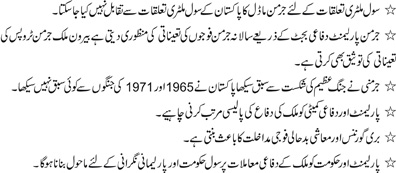
|
|
| |
|
|
| |

|
|
| |
|
|
| |

|
|
| |
|
|
| |

|
|
| |
|
|
| |
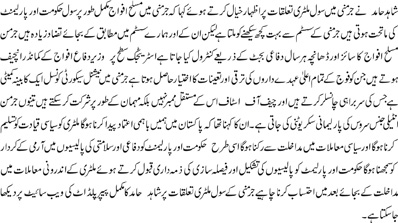
|
|
| |
|
|
| |

|
|
| |
|
|
| |

|
|
| |
|
|
| |

|
|
| |
|
|
| |

|
|
| |
|
|
| |

|
|
| |
|
|
| |

|
|
| |
|
|
| |
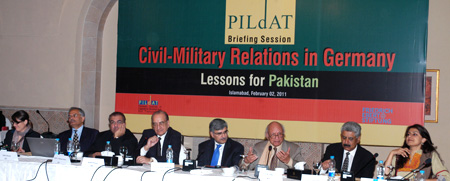
|
|
| |
|
|
| |
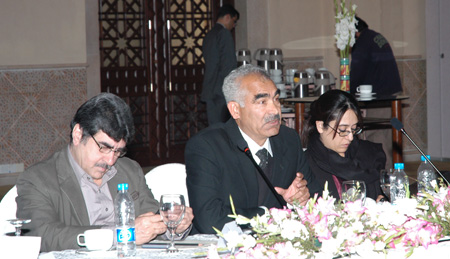
|
|
| |
|
|
| |
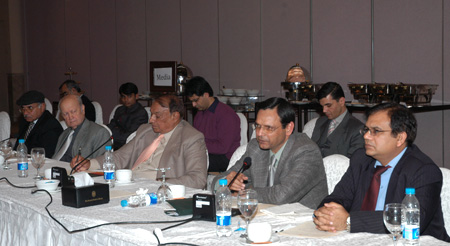
|
|
| |
|
|
| |
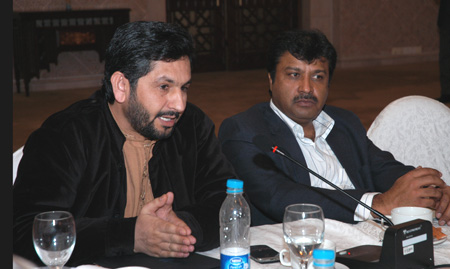
|
|
| |
|
|
| |

|
|
|
|
|
|
|
|
|